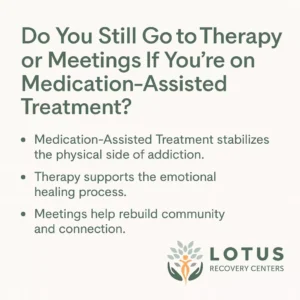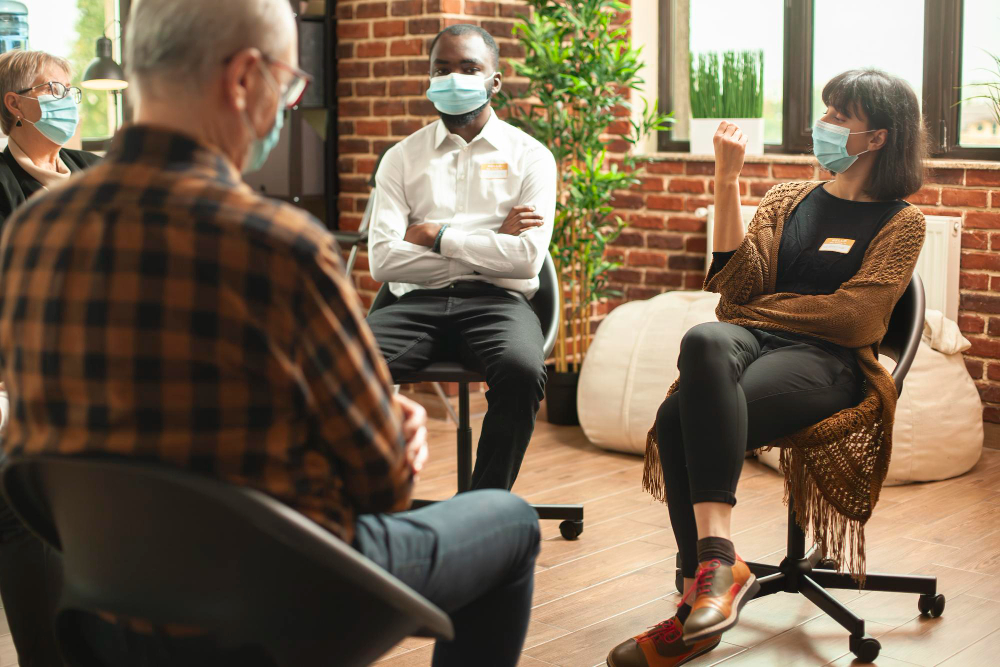Early recovery is weird. It’s the kind of quiet that feels loud. You’re doing the right things—maybe even on Medication-Assisted Treatment—but something still aches.
Maybe you’re sitting in your room after your dose kicks in, thinking: I’m sober…so why do I still feel alone?
Maybe you went to a meeting and left halfway through because someone made a comment about “real sobriety.”
Maybe you wonder if MAT means you’re not doing it “right.”
Let’s clear something up: MAT is recovery. But recovery also needs connection.
At Lotus Recovery Centers in Wilmington, DE, we believe medication can be a powerful ally—but not the whole story. Therapy and peer support aren’t just optional extras. They’re often the missing piece.
Can You Still Go to Therapy and Meetings on MAT?
Yes. And not only can you—you should, if you can.
Medication-Assisted Treatment helps with the physical part of addiction. Therapy helps with the mental and emotional stuff: shame, trauma, anxiety, grief.
Meetings help with the spiritual and social piece: loneliness, belonging, and the “do they really get it?” question.
MAT is a foundation. But recovery is a house. And you deserve more than just a roof—you deserve rooms to feel safe in.
What If I Feel Judged at Meetings?
Some people don’t get it. That’s not your fault.
Recovery communities are getting better about accepting MAT, but the stigma still exists. If someone says, “You’re not sober if you’re on Suboxone,” they’re speaking from bias, not science—or empathy.
You don’t owe anyone a defense of your recovery.
You just owe yourself the right support.
If a meeting leaves you feeling ashamed or “less than,” it’s okay to try a different one. There are harm-reduction groups, pro-MAT fellowships, and online spaces where people talk openly about using medication as part of recovery.
Is MAT Enough on Its Own?
Sometimes yes—for a little while. Many people feel a sense of relief when they start MAT: cravings go down, brain fog lifts, withdrawal chills fade.
But then what?
That’s when the emotions show up. The old memories. The hard questions. The silence that used to be filled with substances.
This is where therapy or groups matter. Because MAT is a tool, not a total solution. It helps you stabilize so you can do the deeper work.
What If I Feel Like I Don’t Belong Anywhere?
Here’s the secret nobody talks about enough: almost everyone in early recovery feels like that.
Especially if you’re young. Especially if your recovery looks different. Especially if you’re still grieving the version of you who drank or used to feel okay.
Feeling out of place doesn’t mean you’re in the wrong place—it means you’re in transition.
Stick around. It can get better. And when it does, it gets so much better.
Why Meetings Still Matter—Even With MAT
You know that ache you get after scrolling for too long? That weird loneliness even when your feed is full?
Recovery without community can feel like that. And MAT can sometimes trick you into thinking you don’t “need” connection anymore.
But meetings give you something that medication can’t: human mirrors. People who say, “Same here.” People who laugh at the same broken stories. People who remind you that your pain isn’t a punishment—it’s just part of the work.
Do I Have to Choose Between a Spiritual Path and Medication?
No. You don’t have to pick between faith and science.
Some 12-step groups focus heavily on “clean time,” and that can feel like a clash. But more and more people are holding space for both: believing in a higher power and honoring the medical support they need.
Your recovery is allowed to be both/and.
Both chemical support and connection.
Both trauma work and medication.
Both real—and really yours.

What Does Recovery Look Like on MAT?
Sometimes, it looks like crying in therapy after a year of feeling numb.
Sometimes, it looks like skipping a meeting because you’re scared, then going anyway the next day.
Sometimes, it looks like taking your medication every morning and still feeling like you’re not enough.
And sometimes—it looks like laughing at a joke in group, realizing you’ve been sober six months, and feeling… okay.
How to Find Support That Respects MAT
You deserve support that honors your full story—not just your pharmacy label.
Here’s how to find it:
- Ask directly: “Do you work with clients on MAT?” A good provider will say yes—without flinching.
- Look for MAT-affirming language in online group descriptions or therapy bios.
- Try harm-reduction or pro-recovery groups, not just abstinence-only ones.
- Trust your gut. If something feels off, it probably is.
👉 Looking for Medication-Assisted Treatment in Prices Corner, Delaware? You’ll find us there too—with people who understand that healing has many paths.
Real Talk: You’re Not Failing If You Need Support
Medication isn’t a shortcut. It’s a strategy.
Therapy isn’t a weakness. It’s a gift.
Meetings aren’t for “those people.” They’re for all of us—especially when we feel like we don’t belong anywhere.
FAQs About MAT and Recovery Support
Can I be in a 12-step program while on MAT?
Yes, but not all 12-step groups are the same. Some are more accepting of MAT than others. It’s okay to try different meetings until you find one that respects your path.
Will therapy be effective if I’m already on medication?
Absolutely. In fact, MAT can make therapy more accessible by reducing anxiety, cravings, or physical withdrawal symptoms—so you can focus on the deeper emotional work.
How long should I stay on MAT before starting therapy or meetings?
There’s no perfect timeline. Some people start therapy on Day 1 of MAT. Others wait until they feel physically stabilized. The best time to start is when you’re ready to talk—and when you feel safe enough to open up.
What if my therapist or sponsor doesn’t support MAT?
That’s a red flag. You deserve support that aligns with your recovery—not one that shames or undermines it. It’s okay to switch providers or find a new sponsor.
Can MAT become a crutch?
MAT isn’t a crutch—it’s a tool. Like any tool, it can be misused, but when managed well and paired with support, it’s one of the most evidence-based ways to reduce overdose risk and support long-term recovery.
📞 Ready to Feel Seen, Not Judged?
Call (833) 922-1615 or visit our Medication-Assisted Treatment page to find real support in Wilmington, DE—support that meets you where you are, honors your recovery, and helps you reconnect to the parts of life that matter.

